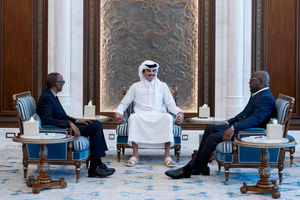Prime
Unveiling autism spectrum: Path to understanding and change

What you need to know:
- Dr Msuya-Lasway highlights the importance of trust and safety in supporting autistic individuals. This allows them to be themselves, leading to a discovery of their strengths and areas where they may need help.
“Why, why?” is a question that parents ask all the time.
“Why did my child develop autism?” As a researcher, Dr Msuya-Lasway turned to literature to find answers to this question.
Dr Msuya-Lasway explains that autism is not a single condition, but a spectrum of disorders.
She uses two examples: Drew, a nonverbal 13-year-old who self-injures when anxious, and Abigail, a gifted nine-year-old who struggles with social interaction.
Both have autism diagnoses, highlighting the spectrum’s diversity.
She says Abigail is quite remarkably gifted in mathematics. She can easily multiply three numbers by three numbers in her head, yet when it comes to having a conversation, she has great difficulty.
She does not make eye contact.
She has difficulty starting a conversation, feels awkward, and when she gets nervous, she shuts down.
Yet both children have the same diagnosis of autism.
Autism, also known as autism spectrum disorder (ASD), is a developmental disorder distinguished by difficulties with social interaction, communication, and repetitive behaviours, she says.
Dr Msuya-Lasway is a researcher, originally from Tanzania living in Virginia.
She holds a PhD in Health Informatics, and a master’s degree in Public Health with a focus on Global and Community Health.
She explains that an estimated 1 in every 46 children are diagnosed with autism in Virginia.
Those numbers are even higher for those who are yet to be diagnosed.
Stigmas related to ASD have led Dr Msuya-Lasway to advocate for transformational societal changes and perceptions related to autism, and she seeks to extend that knowledge to her fellow Tanzanians.
“Several years ago in California”, Dr Msuya-Lasway explains, “an estimated 132 children got measles by either visiting Disneyland or being exposed to someone who’d been there.
One of the tragic things about this outbreak is that measles, which can be fatal to a child with a weakened immune system, is one of the most easily preventable diseases in the world.
An effective vaccine against it has been available for more than half a century, but many of the children involved in the Disneyland outbreak had not been vaccinated because their parents were afraid of something allegedly even worse: autism!
The paper that sparked the controversy about autism and vaccines was later debunked, retracted, and branded as a deliberate fraud by the British Medical Journal, however, millions of parents worldwide continue to fear that vaccines put their kids at risk for autism.
Dr Msuya-Lasway, states that children with autism tend to see the world differently.
Difference does not mean lesser! She exclaims.
Some of the most innovative and transformational minds of our time are from individuals with autism.
Elon Musk, the visionary entrepreneur and CEO, has publicly shared in 2021 that he has Asperger’s Syndrome, which is a form of autism.
The entrepreneur Bill Gates – founder of the world’s largest software business, Microsoft has been suspected to be autistic.
But yet, parents and caregivers of children with autistic characteristics shy from seeking care and may even try to suppress traits that are not considered “normal”, hindering their child’s natural potential.
“I know what you’re thinking”, Dr Msuya-Lasway says, – so what do we do about it? Is the question on everyone’s mind.
Cultivating trust and safety is key because it allows people to be vulnerable and creates a powerful environment enabling people to be their best.
Dr Msuya-Lasway explains: “When people feel safe, it enables them to be their authentic selves, to flourish, and to be honest about their challenges.
This leads to a journey of discovery and celebration of the child’s strengths, as well as the identification of areas that they may need some assistance with.
Exposing your child to a myriad of experiences will bolster curiosity that would lead to growth.
”So back to the question of “why?”, well Dr Msuya-Lasway states – “beyond increased awareness and improved scoring models for diagnostic evaluations, there’s probably not one single answer. Just as autism is a spectrum, there’s a spectrum of etiologies and a spectrum of causes.
Based on epidemiological data, we know that one of the causes, or one of the associations, is advanced paternal age, that is, increasing the age of the father at the time of conception.
In addition, another vulnerable and critical period in terms of development is when the mother is pregnant.
During that period, while the foetal brain is developing, we know that exposure to certain agents can increase the risk of autism.
In particular, there’s a medication, valproic acid, which mothers with epilepsy sometimes take, that can increase the risk of autism.
In addition, there can be some infectious agents that can also cause autism.
In fact, in some individuals with autism, it is genetic! There could be, one single, powerful, deterministic gene that causes autism.
However, in other individuals, it’s a combination of genes in part with the developmental process that ultimately determines that risk for autism.
There are between 200 to 400 different genes that can cause autism.
And that explains, in part, why we see such a broad spectrum in terms of its effects.
We don’t know in any one person, necessarily, which of those answers it is until the child undergoes clinical and genetic testing.
“Although there are that many genes, there is one proven evidence-based approach for treatment, and that is Advanced Behavioural Analysis, also known as ABA therapy.
Early ABA Intervention is key, says Dr Msuya-Lasway.
With the mission of educating parents and caregivers, Dr Msuya-Lasway aims to reach out to fellow Tanzanians in the diaspora who have children with autism and are seeking assistance in navigating resources.
Dr Msuya-Lasway has been eager to help children living with autism in Tanzania and urges any parent who lives with an autistic child to reach out for advice, resources, more information, or a word of support.
Dr Msuya-Lasway continued by saying: “As much as we know from the literature, there is so much more that we are still unaware of, and so I invite all of you to help us think about how we can do better.
As a community, our collective wisdom will enable us to make a difference and in particular, for individuals with autism and their parents, caregivers, teachers, community workers, and you. I invite you to join the discussion and be part of the solution because it’s going to take a lot of us to think about what’s important and what’s going to make a meaningful difference.
Dr Msuya-Lasway finishes off by reinforcing the call to action: “So, again, I urge everyone to join the mission so that it can lead to a better future for individuals with autism and cultivate hidden gifts by transforming perceptions about what it means to be autistic.
“It is through this very transformation, and normalisation that we will start seeing increased advancements in our future for generations to come.”




